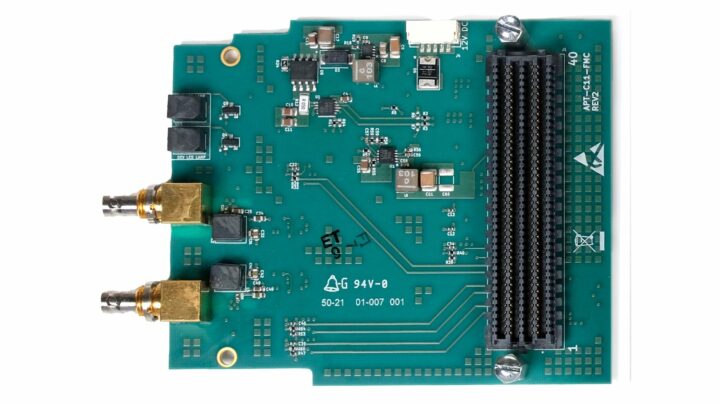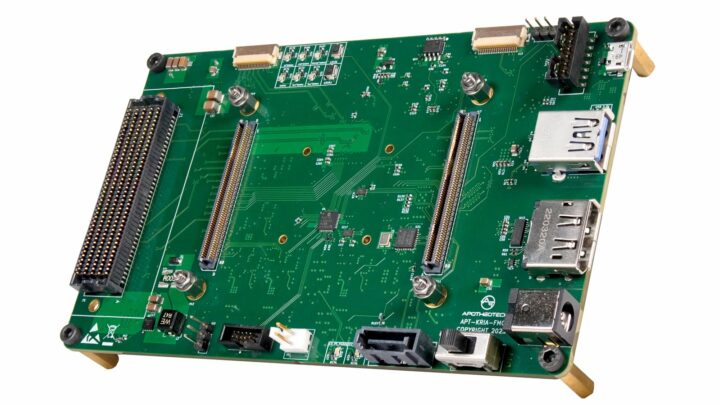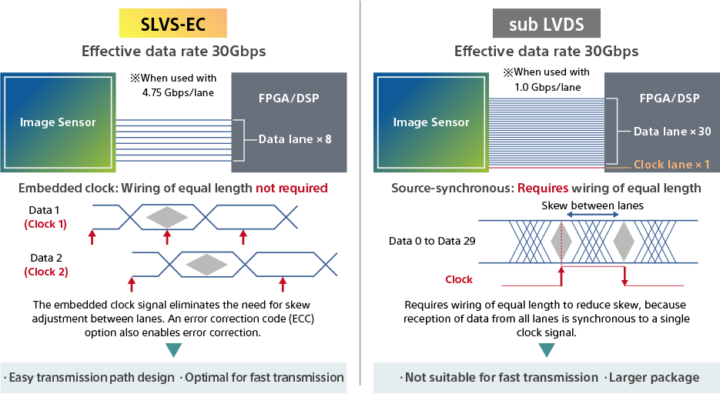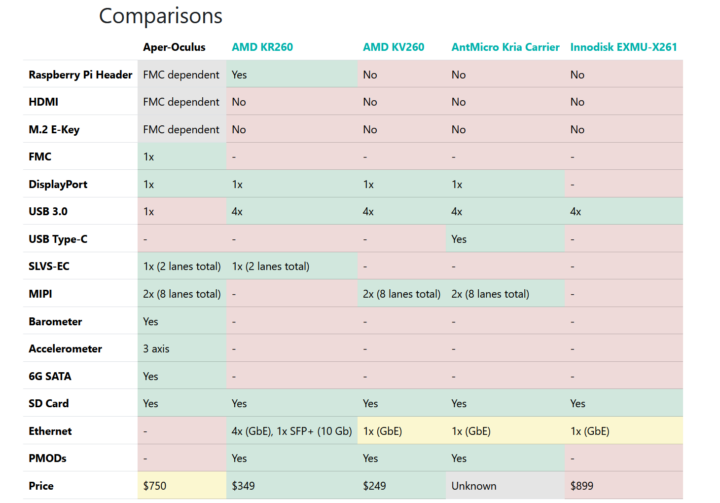The Aper-Oculus board is an open-source hardware camera carrier board for the AMD Xilinx Kria system-on-modules aimed at high-speed computer vision applications.
The carrier board is built around the Sony SLVS-EC (Scalable Low-Voltage Signaling with Embedded Clock), a high-speed interface standard that delivers high-resolution video output to the FPGA. It also features several connectivity options, including dual MIPI connectors, USB 3.0, DisplayPort, and SATA to accommodate the varying demands of AI and robotics projects.
The Kria K24 and K26 SOMs are adaptive system-on-modules designed for edge and vision applications. These small modules are ruggedized and come with hardware acceleration enabled out-of-the-box. The Kria lineup also includes a series of starter kits, such as the KR260 Robotics Starter Kit, which are designed for early evaluation and development.
Aper-Oculus specifications:
- Processor-Board Support – Compatible with AMD Xilinx Kria SOMs
- Video Interface – SLVS-EC for high-speed, high-quality video input
- Expansion – FMC connector for custom expansions
- Storage – SATA III interface, SD card
- Display – DisplayPort
- Camera – 2x 4-lane MIPI CSI (22-pin, Raspberry Pi compatible)
- USB – USB 3.0 Type-A
- Misc – Barometer, 3-axis accelerometer
- Power Supply – 12V via DC jack
As mentioned earlier, the Aper-Oculus project is completely open-source. Once the campaign has been successful, all relevant documentation, source code, and design files will be added to the relevant GitHub repository.
Aper-Oculus is definitely on the high end, at $750 for the camera carrier board alone without the Kria module. While the cost seems to be on par with other third-party boards for the AMD Kria Xilinx SOM, it is more expensive than the alternatives from AMD.
When questioned about the price difference, the maker of the Aper-Oculus, Chance Reimer, explained that it is “due to the buried vias + dielectric material” that were selected to support a data rate of up to 16Gbps for the FMC transceivers. He also mentioned the projected low volume of orders and a 20% duty imposed on products made and sent from China. From the price alone, it is obvious that this product is aimed at industrial and commercial users.

The FMC interface on the Aper-Oculus camera dev board allows expansions to be connected to the board. Two expansion boards, the CXP Dualis FMC and VincuLink FMC, are sold separately and are available on the project page. The boards are priced at $449 and $199, respectively.
The CXP Dualis FMC board (pictured above) is an add-on module that can be used to prototype both host and device solutions for CoaXPress (the coaxial cable-based communication for high-speed, serial data). The VincuLink FMC board is a GPIO-expansion board that allows the Aper-Oculus board to interface with Raspberry Pi HATs, M.2 E-Key PCIe cards, and peripheral modules (PMODs).
As mentioned earlier, the Aper-Oculus camera development board is priced at $750. The project launched on December 21, 2023, and is a long way off from its funding goal of $17,500. Shipping is free worldwide for all boards and orders are expected to ship on June 14, 2024 onwards. Other essential components and add-ons can be found on the Crowd Supply page.

Tomisin is a writer specializing in hardware product reviews, comparisons, and explainers. He is very passionate about small form factor and single-board computers.
Support CNX Software! Donate via cryptocurrencies, become a Patron on Patreon, or purchase goods on Amazon or Aliexpress







